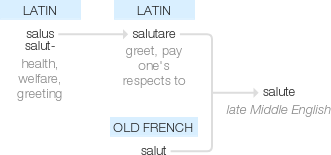Salute
late Middle English: from Latin salutare ‘greet, pay one's respects to’, from salus, salut- ‘health, welfare, greeting’; the noun partly from Old French salut .
wiktionary
Borrowed from Latin salūtō(“to greet; to wish health to”), from salūs(“greeting, good health”), related to salvus(“safe”).
etymonline
salute (v.)
late 14c., "to greet courteously and respectfully," earlier salue (c. 1300), from Latin salutare "to greet, pay respects," literally "wish health to," from salus (genitive salutis) "greeting, good health," related to salvus "safe" (from PIE root *sol- "whole, well-kept"). The military and nautical sense of "display flags, fire cannons, etc., as a mark of respect" is recorded from 1580s; specific sense of "raise the hand to the cap in the presence of a superior officer" is from 1844.
salute (n.)
c. 1400, "act of saluting, respectful gesture of greeting, salutation," from salute (v.). The military sense is from 1690s; specifically of the hand-to-cap gesture from 1832.
